
Brazil: Amazon and Salvador da Bahia,
July 2009
Pelourinho, Candomblé ceremony
Page 10 of 17
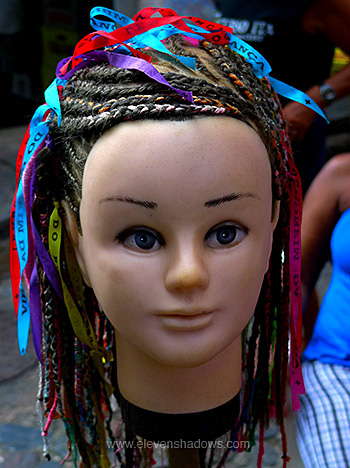 11
July Saturday - Lisa and I got up and decided to go shopping in the
Pelourinho, the historic center of Salvador. I got sucked into Planet
Music,
Cana Brava, and another small shop that sold vinyl, picking up some
1970s Brazilian LPs. If there's any one shopping vice I have, it's
music. 11
July Saturday - Lisa and I got up and decided to go shopping in the
Pelourinho, the historic center of Salvador. I got sucked into Planet
Music,
Cana Brava, and another small shop that sold vinyl, picking up some
1970s Brazilian LPs. If there's any one shopping vice I have, it's
music.I also have a weakness for photographing interesting mannequins. Here we have one for a hairstylist with a hair full of fitas, wish ribbons from Bonfim designed to bestow good fortune. I have one on my wrist, and am told to keep it on until it falls off naturally, lest I ruin my three wishes. Lisa had heard about a restaurant famous for its outstanding beans, Alaide Do Feijão, just to the left of Igreja da Ordem Terceira de São Francisco down a small cobblestone alleyway. And the beans, mixed with Portuguese sausage, were outstanding. It came with rice, vegetables, farofa (manioc, which is cassava wheat). I returned here the following week for more. |
 After
the hearty lunch, Lisa and I waddled downhill to triangle-shaped Largo do
Pelourinho, where the "whipping post" (pillory) was located until finally
taken away in the early 1800s. After
the hearty lunch, Lisa and I waddled downhill to triangle-shaped Largo do
Pelourinho, where the "whipping post" (pillory) was located until finally
taken away in the early 1800s.This is also the location where Michael Jackson had filmed a video for the song "They Don't Care About Us" with Olodum, a band from Salvador who slowly wandered the streets on Tuesday evenings for Benção, or Blessing, the Pelourinho's weekly party. |
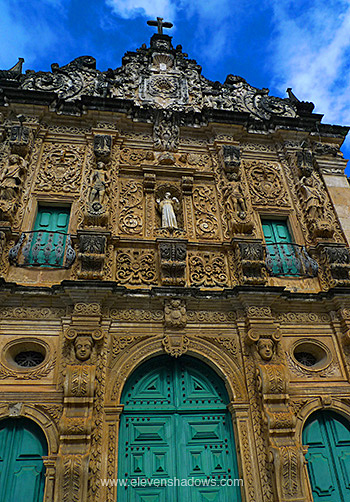 Another
look at the amazing 17th Century baroque façade of Igreja da Ordem Terceira
de São Francisco. This façade was actually covered in the late 18th century
until it was accidentally discovered in the 1930s when a workman hammered
some plaster off to install wiring. Another
look at the amazing 17th Century baroque façade of Igreja da Ordem Terceira
de São Francisco. This façade was actually covered in the late 18th century
until it was accidentally discovered in the 1930s when a workman hammered
some plaster off to install wiring. |
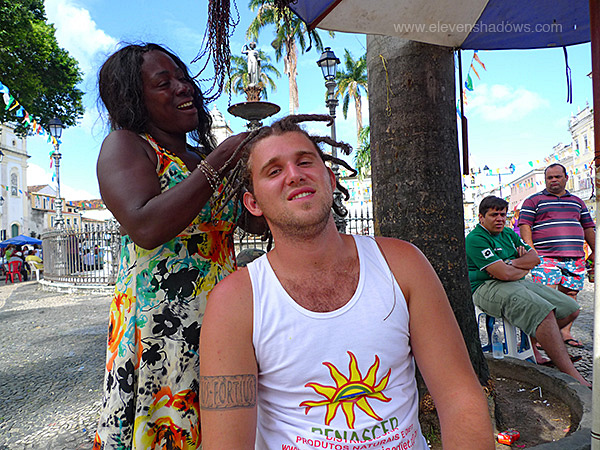 Crossing
the Terreiro de Jesus, we stopped briefly to watch someone getting their
hair braided Salvador style. Crossing
the Terreiro de Jesus, we stopped briefly to watch someone getting their
hair braided Salvador style. |
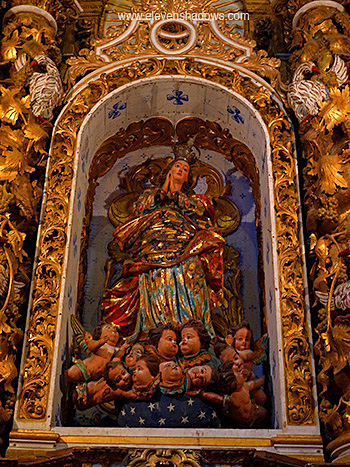 Next
to the enormous Catedral
Basílica, we came upon a painting on
canvas of Barack Obama with a daisy coming out of his mouth.
Intrigued, I asked the painter why he painted thusly. "Love, peace for
EVERYONE!!" It now adorns our dining room. To be fair, we may
have purchased one if it were Dick Cheney with a daisy in his mouth.
Or not. Next
to the enormous Catedral
Basílica, we came upon a painting on
canvas of Barack Obama with a daisy coming out of his mouth.
Intrigued, I asked the painter why he painted thusly. "Love, peace for
EVERYONE!!" It now adorns our dining room. To be fair, we may
have purchased one if it were Dick Cheney with a daisy in his mouth.
Or not.Afterwards, we went inside the Catedral Basílica. Without Carmelito the guide pointing out freemasonry symbols or saying, "stupid tourists destroyed this. I hate them," we still managed to enjoy ourselves. However, he would have assuredly explained to us why this saint has lots of heads at her feet. |
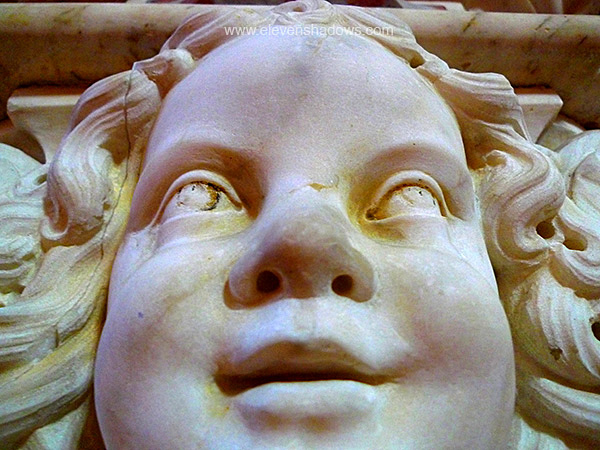 Up
close and personal with one of the angels of
Catedral Basílica in
the Pelourinho. Up
close and personal with one of the angels of
Catedral Basílica in
the Pelourinho. |
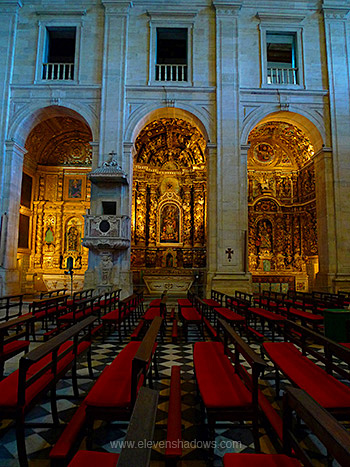 The
interior of the cavernous Catedral
Basílica. The
interior of the cavernous Catedral
Basílica. |
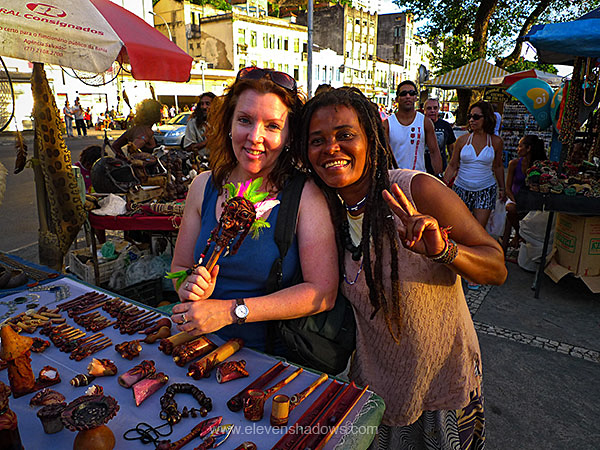 From
the upper city, we took the Elevador Laserda down to the lower artesanal
market. My main intention was to come here to purchase a cheap white
T-shirt for the candomblé ceremony we were to attend later that evening.
But so far, we had managed to look at everything but that. No matter.
Lisa befriended a very amiable vendor who sold various carvings from local
artisans. From
the upper city, we took the Elevador Laserda down to the lower artesanal
market. My main intention was to come here to purchase a cheap white
T-shirt for the candomblé ceremony we were to attend later that evening.
But so far, we had managed to look at everything but that. No matter.
Lisa befriended a very amiable vendor who sold various carvings from local
artisans. |
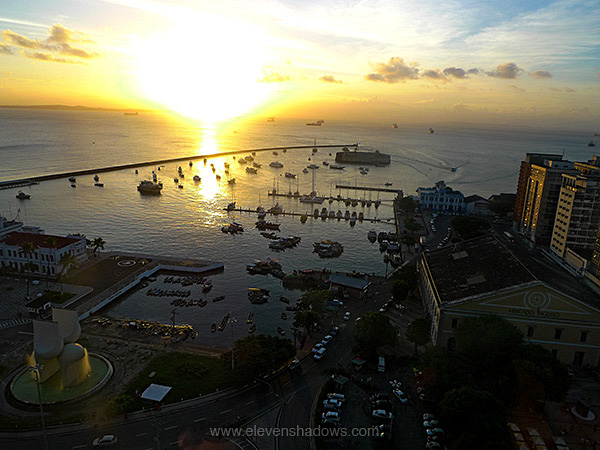 Finally
having purchased a nice white shirt for the candomblé ceremony, we took the
Elevador Laserda back up before it got dark, as others had warned us not to
be near the bottom after the sun set. Every day, we heard 3-4 warnings
not to go down a certain street, not to be caught out after dark in a
certain neighborhood, to watch the camera bag, to watch out for thieves
here. And I was growing even more paranoid because they were not idle
warnings. Finally
having purchased a nice white shirt for the candomblé ceremony, we took the
Elevador Laserda back up before it got dark, as others had warned us not to
be near the bottom after the sun set. Every day, we heard 3-4 warnings
not to go down a certain street, not to be caught out after dark in a
certain neighborhood, to watch the camera bag, to watch out for thieves
here. And I was growing even more paranoid because they were not idle
warnings.This is a view from the top of the Elevador Laserda. |
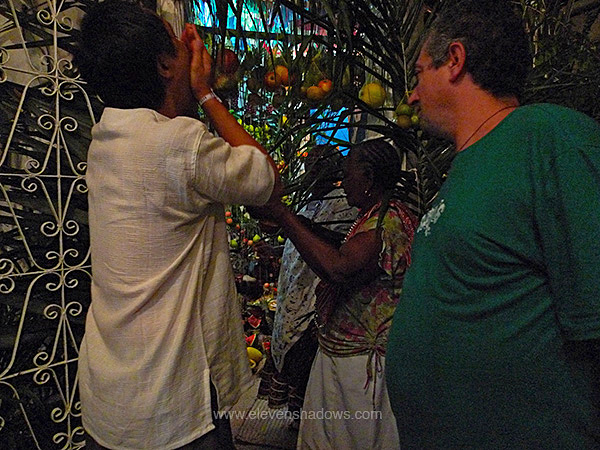 Lisa
and I wanted to attend a ritual of candomblé, a West African-derived or
Afro-Brazilian religion, which largely originated in Salvador.
Candomblé draws inspiration from a variety of people of the African
Diaspora, but primarily features aspects of Yoruba orishas. Alex from
Open
House Barra called a taxi because he felt it would be safer if we
were dropped off in front of the home. "It's not a good neighborhood,"
he said. Lisa
and I wanted to attend a ritual of candomblé, a West African-derived or
Afro-Brazilian religion, which largely originated in Salvador.
Candomblé draws inspiration from a variety of people of the African
Diaspora, but primarily features aspects of Yoruba orishas. Alex from
Open
House Barra called a taxi because he felt it would be safer if we
were dropped off in front of the home. "It's not a good neighborhood,"
he said.
But the taxi driver didn't know where it was, asking repeatedly. We were finally dropped off nearby, and a local guy led us through narrow alleyways to the house holding the candomblé ceremony. We arrived. The dancing and percussion playing had already begun. We sat, men on the right, women on the left. A short time later, I was invited to share in the wine-drinking, which was done from a wood-like gourds (see photo). |
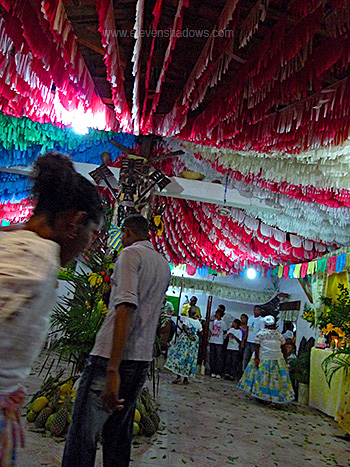 A
quartet of percussionists played, three on drums, one on agogo bells,
calling out between rhythms. Sometimes everyone sang. Several
women dressed in white traditional dresses swayed and danced slowly around
the middle pole with festooned with a dark wooden orixa (orisha), fruit, and
pink and white ribbons at the top. A
quartet of percussionists played, three on drums, one on agogo bells,
calling out between rhythms. Sometimes everyone sang. Several
women dressed in white traditional dresses swayed and danced slowly around
the middle pole with festooned with a dark wooden orixa (orisha), fruit, and
pink and white ribbons at the top.After the dancing, everyone went outside to a shrine. The priestess gave drinks of wine in bowls of gourd. The initiates who went inside received an orisha from above, and now possessed, occasionally shook violently, sometimes emitting noises. Eventually, they emerged from the shrine in an altered state, sometimes seeming like they might fall. Everyone walked back inside. The drummers started up. The women danced again. The possessed initiates lit cigars from a ceremonial candle and danced in trance, sometimes dancing frenetically, other times walking about slowly. Some priestesses began hugging those of us on the periphery. |
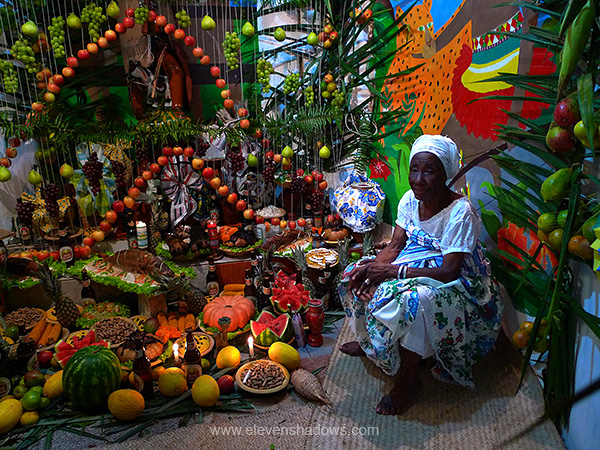 The
priestess of the shrine outside the candomblé house amidst many offerings of
fruit. The
priestess of the shrine outside the candomblé house amidst many offerings of
fruit.The few other tourists who were there got up to leave. Nervous about the neighborhood that Alex had warned us about, we followed them, all of us marching up a steep hill. There were taxis, and we flagged one down. But we weren't going back to the house yet. It was a Saturday night, and there was a band from Angola playing at Sankofa in the Pelourinho, where we had previously had the delicious fish stew in peanut sauce. |
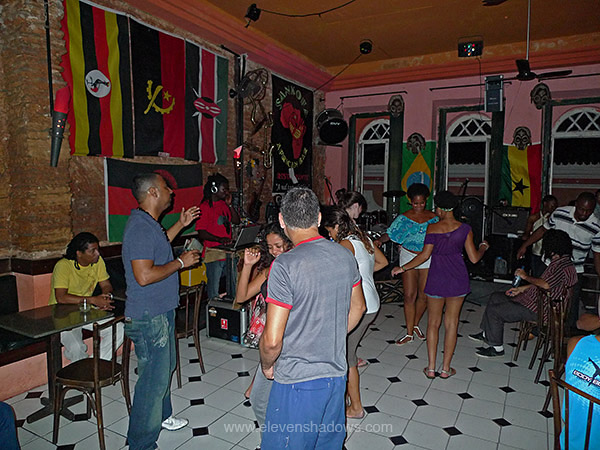 We
arrived at
Sankofa around 11pm, early by Bahian standards. Hardly anyone was
there, although in an hour or two, it'd be wall to wall with people. We
arrived at
Sankofa around 11pm, early by Bahian standards. Hardly anyone was
there, although in an hour or two, it'd be wall to wall with people.Musicians from the Angolan band kept carrying in musical instruments to the stage. We ate fries and espaguetti africano (African spaghetti). In Ghana, that had meant a specially spiced meat sauce; here, I wasn't entirely sure what it was. A DJ spun groovy Bahian, African, and, curiously, Bollywood music. At half past midnight, the musicians began carrying away the musical instruments. Never mind that the band never played. The musicians kept breaking down and carrying the instruments downstairs. Just before 1am, we caught a taxi. The driver ran every red light, just as a city bus had earlier. Taxi and bus drivers did this regularly at night to avoid carjackings. |
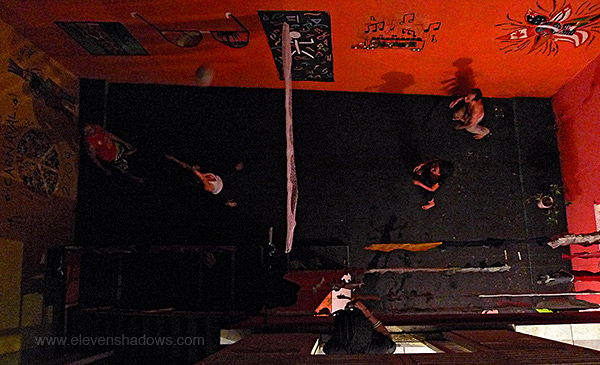 12
July Sunday - Lisa and I woke up late, a lazy Sunday. We walked
near the beach to get hamburgers and fresh açaí juice, then walked
around the point, past the fort, along the beaches. I also ran over to
the local supermarket to pick up more cachaça and limes for
caipirinhas. 12
July Sunday - Lisa and I woke up late, a lazy Sunday. We walked
near the beach to get hamburgers and fresh açaí juice, then walked
around the point, past the fort, along the beaches. I also ran over to
the local supermarket to pick up more cachaça and limes for
caipirinhas.
I spoke to Alex. Most of the time, he sits at his computer creating websites, doing flash for clients. He is a flash guru, and has a company for creating websites, in21.com. Alex and his wife Jaqueline, a choreographer, also create documentaries about Salvador. We ate at the bar area a short walk away, eating Bahian-style beans and rice while watching futebol. One aspect of cities such as Salvador, or for that matter in India, Thailand, Burma, South America or elsewhere, is how alive the streets are. Each block had a fruit stand, friendly places where neighborhood people gathered to share drinks and food and conversation, eat street food, and have a sense of community. Salvador was alive with this. In comparison, Los Angeles was gravely dull. We hid in our homes. There's no neighborhood market, no fruit stand just outside, no places to gather. Places like this made me long for a sense of belonging, a sense of community. We returned just as a game of volleyball was ending (see photo above). It was time for Jaqueline to teach samba. |
Brazil: Amazon and Salvador da Bahia, July 2009
Page 10 of 17
1 2 3 4 5 6 7 8 9 10 11 12 13 14 15 16 17
EXTRA: Lisa's Photos and Videos of the Amazon
Eleven Shadows Travel Page
Contact photographer/musician Ken Lee